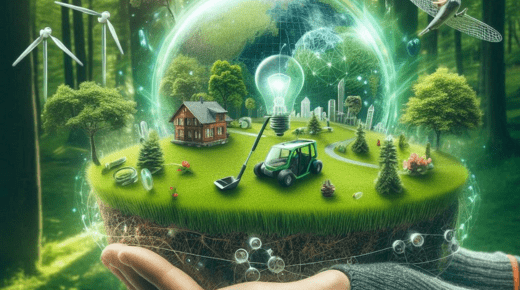Imagine stepping outside to a lush, green lawn that’s not only beautiful but also eco-friendly. As we become more conscious of our environmental impact, the demand for sustainable lawn care services is skyrocketing. Traditional methods often rely on harmful chemicals and excessive water use, but the future promises innovative solutions that protect our planet.
I’ve seen a growing trend towards organic fertilizers, smart irrigation systems, and electric lawn equipment. These advancements not only reduce our carbon footprint but also promote healthier, more resilient lawns. Similarly, efficient water heater services play a crucial role in minimizing energy consumption and supporting eco-friendly homes. It’s an exciting time for eco-conscious homeowners and lawn care professionals alike, as we move towards greener, more sustainable practices.
The Current Landscape of Lawn Care Services
Lawn care services have evolved significantly in response to environmental concerns. Traditionally, lawn care relied heavily on chemical fertilizers, gas-powered equipment, and extensive water usage. This approach caused environmental damage, including soil degradation and water pollution.
In contrast, today’s lawn care methods focus more on sustainability. Many companies now offer organic fertilizers, which boost soil health without harming local ecosystems. For instance, instead of using synthetic chemicals, these organic options feed plant roots naturally. Moreover, the introduction of smart irrigation systems has revolutionized water conservation. These systems adjust watering schedules based on weather data, ensuring lawns get the right amount of water without waste.
Electric and battery-powered lawn equipment is becoming more common among professionals. These tools produce less noise and zero emissions, significantly reducing air pollution. Examples include electric mowers and battery-operated hedge trimmers, which are quieter and more efficient.
The shift towards sustainable practices is supported by increasing consumer demands. Homeowners seek eco-friendly solutions to maintain their lawns, driven by a greater awareness of environmental issues. Consequently, lawn care companies are adapting to meet this demand, incorporating greener methods in their services.
Technological advancements also play a crucial role in this landscape. Innovations like drone technology for aerial lawn surveys and app-based service management streamline operations and provide precise care. Lawn care specialists can now offer more tailored services, meeting specific ecological needs.
Innovations in Eco-Friendly Lawn Care
Eco-friendly lawn care’s future holds significant promise. Several cutting-edge innovations reshape how we care for our lawns with minimal environmental impact.
Organic Lawn Treatments
Organic lawn treatments offer a sustainable alternative to chemical fertilizers. These treatments involve natural products like compost tea, seaweed extract, and organic-based fertilizers. For example, compost tea enriches the soil with beneficial microorganisms, promoting healthier grass growth. Seaweed extract provides necessary minerals, and organic-based fertilizers offer a slow-release nutrient source. These treatments enhance soil structure and increase resilience against pests and diseases, making lawns healthier and more sustainable. Using organic treatments reduces the dependence on synthetic chemicals, lowering environmental harm and promoting ecological balance.
Electric and Battery-Powered Equipment
Electric and battery-powered equipment significantly reduces carbon emissions compared to traditional gas-powered tools. This equipment includes lawnmowers, trimmers, and leaf blowers that operate quietly and produce zero emissions. For instance, electric lawnmowers now offer comparable performance to their gas counterparts, with the added benefit of reducing air and noise pollution. Battery-powered trimmers and blowers provide efficient yard maintenance without harmful fumes. Adoption of these tools leads to improved air quality and quieter neighborhoods, aligning with the goals of eco-friendly lawn care services. The advancements in battery technology extend the operation time and efficiency of these tools, making them practical for both residential and commercial use.
Benefits of Eco-Friendly Lawn Care
Eco-friendly lawn care offers several critical advantages, making it a preferred choice for both homeowners and the environment.
Environmental Impact
Choosing eco-friendly lawn care significantly reduces pollution and conserves natural resources. Organic fertilizers, for example, improve soil health without introducing harmful chemicals. This aids in maintaining the local ecosystem. Smart irrigation systems help conserve water by using data-driven practices to ensure lawns get only the necessary amount of water, preventing wastage. Electric lawn equipment like mowers and trimmers reduces carbon emissions and noise pollution. The move towards greener practices helps reduce the overall carbon footprint and promotes biodiversity in urban and suburban areas.
Health Advantages
Eco-friendly lawn care leads to a healthier living environment. Organic fertilizers and pesticides, free of toxic chemicals, pose fewer health risks to families and pets. These products prevent exposure to harmful substances that can cause respiratory issues or skin irritations. Lawns maintained with eco-friendly practices typically have better soil structure and microbial life, reducing the presence of pests without the need for harsh chemicals. This creates a safer space for outdoor activities, especially for children. Additionally, quieter electric equipment reduces noise pollution, contributing to overall mental well-being for homeowners and their neighbors.
Technological Advances Shaping the Future
Technological advancements continue to revolutionize eco-friendly lawn care. Innovations in smart irrigation systems and robotic lawn mowers offer new levels of efficiency and sustainability in lawn maintenance.
Smart Irrigation Systems
Smart irrigation systems enhance water efficiency through advanced technology. These systems monitor soil moisture, weather conditions, and plant needs to deliver precise watering. Using sensors and automated schedules, they reduce water waste and ensure optimal lawn hydration. For example, the Rachio Smart Sprinkler Controller adjusts watering schedules based on real-time weather data, reducing water usage by up to 50%.
Robotic Lawn Mowers
Robotic lawn mowers offer eco-friendly, low-maintenance lawn care solutions. These devices use GPS technology, sensors, and boundary wires to navigate lawns and maintain even grass heights. Models like the Husqvarna Automower operate quietly, reducing noise pollution. Their electric engines produce no direct emissions, contributing to a cleaner environment. Additionally, they save time and effort, allowing homeowners to focus on other tasks while the lawn is neatly trimmed automatically.
Challenges and Considerations
Adopting eco-friendly lawn care practices poses several challenges and considerations. It’s crucial to understand these factors to effectively transition to sustainable solutions.
Cost Barriers
Initial investments in green technologies, such as electric lawn mowers and smart irrigation systems, are often higher compared to traditional equipment. Many consumers and small businesses hesitate due to these upfront costs. For instance, while a standard gas lawn mower might cost $200, an electric model with advanced features can exceed $500. Moreover, shifting to organic fertilizers increases monthly costs because these products typically cost 20%-60% more than synthetic alternatives.
Market Adoption
The transition to sustainable practices also faces resistance from both consumers and lawn care providers. Many clients are accustomed to immediate results from chemical treatments and may doubt the efficacy of organic alternatives. Convincing them of the long-term benefits of eco-friendly methods requires substantial education and trust. Lawn care providers, particularly smaller firms, may resist adopting new technologies due to training costs and the challenge of modifying established workflows. In regions where water restrictions or environmental regulations are less stringent, there’s often less urgency to adopt these green solutions.
By addressing these challenges, eco-friendly lawn care services can gradually overcome barriers and foster a more sustainable future for the industry.

